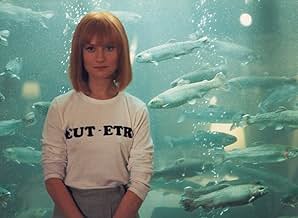अपनी भाषा में प्लॉट जोड़ेंFrederique (Huppert) leaves her family's small-town trout farm to embark on an journey taking her to Japan and into the arms of a man. Irritations concerning her actions and present state of... सभी पढ़ेंFrederique (Huppert) leaves her family's small-town trout farm to embark on an journey taking her to Japan and into the arms of a man. Irritations concerning her actions and present state of feelings begin to fill her mind, forcing her to come to terms with innermost self.Frederique (Huppert) leaves her family's small-town trout farm to embark on an journey taking her to Japan and into the arms of a man. Irritations concerning her actions and present state of feelings begin to fill her mind, forcing her to come to terms with innermost self.
- पुरस्कार
- 1 जीत और कुल 2 नामांकन
फ़ीचर्ड समीक्षाएं
The last conversation in the film: Q to Frederique (Ms Huppert): It is better than in France?
Frederique: It is the same. But Galuchat (Frederique's husband) is in charge.
Those closing lines are spoken with the liquor-addicted Galuchat walking alone with a glass of alcohol outside the restaurant, while his wife has transformed from a village girl of limited means into an incredibly successful international trout farmer. The "trout eggs" have hatched! A small detail that might escape many--towards the end as rich trout farmers from around the world, including Frederique, arrive at the Japanese hotel in a long convoy of limousines, the only sound one hears are the closing of the limousine doors (recalling the final scene of Losey's "Accident" when you don't see the accident but hear it on the soundtrack!)
I confess I'm not a big fan of movies that have as their story line a young woman who uses sex with a series of men to rise above her humble upbringing, ala Barbara Stanwyck in Baby Face(1933). They feel in some way as misogynistic as they are empowering. I'm even less a fan of movies that relegate Jeanne Moreau to such an undeveloped role, although she does get one nice scene standing up for herself towards the end. Oh, Isabelle Huppert is fine here, flirting and beguiling men to get what she wants out of them and flashing her pert little body along the way, but the story was one-dimensional, outdated, and sloppy.
At one point we see Huppert's reflection in multiple mirrors and it brought to mind Marilyn Monroe in How to Marry a Millionaire (1953) and Brigitte Bardot in La Parisienne (1957) from decades earlier. Maybe that's because Joseph Losey originally conceived of this film in the 1960's with Bardot in the lead role. There is an attempt to update things via the acceptance of being bi or gay, and Moreau's character is allowed to say "Nowadays, heterosexuality and homosexuality mean nothing. You're either sexual or you're not," which is pretty remarkable for 1982, but it didn't really feel integrated into what was a meandering plot, and the gay husband never seemed like a real person to me.
The young woman's backstory on the trout farm, in particular seeing her father and his buddy molest girls, tries to explain how she became so manipulative, but it could have been so much better told. The dialogue in the film wasn't very satisfying either. When asked what her first impressions of Japan are, she says that there are lots of Japanese. She meets an older woman who encourages her to have sex without shame, saying she's had it 33,000 times in her life. It's not exactly deep, but maybe this banality was part of the point. How sex relates to power is of course the main thing - as a means of social advancement for the young woman, and as a way of dominating and seeking pleasure for the older men after her. Unfortunately, too often there are scenes that don't push a cohesive narrative or develop these characters, only serving to elongate the movie. It just never pulls itself together, which is a shame, given those who worked on it.
The movie has many luscious sequences in Tokyo and France, and Huppert acts most of the other protagonists off the screen in a difficult role. There are flashbacks of her learning how her father and his friends used women, which increases her resolve not to be abused in similar fashion. She comes across as outwardly unsympathetic, but we understand her motives in a world where rich people treat those around them with the same lack of concern as they do their possessions. Rambert is even less sympathetic and less capable of love than Frédérique.
In this slow-moving narrative style definitely assumes more significance than content, but the film does have a particularly satisfactory ending.
Despite me hating the film, I have enjoyed some of Isabelle Huppert's movies and French movies are my favorite international films. It's just with so many wonderful French films, I don't advise you to waste your time on this one--it's so much easier to find a film worthy of your time.
क्या आपको पता है
- ट्रिवियाAlthough Joseph Losey lived in England for many years and directed many famous British films, this late movie of his has never had commercial showings in the UK, nor ever been shown on British television.
- इसके अलावा अन्य वर्जनOriginal French-language version is 116 minutes long; the version released in the US ("The Trout") is 11 minutes shorter.
टॉप पसंद
- How long is The Trout?Alexa द्वारा संचालित
विवरण
- रिलीज़ की तारीख़
- कंट्री ऑफ़ ओरिजिन
- भाषाएं
- इस रूप में भी जाना जाता है
- The Trout
- फ़िल्माने की जगहें
- Pontarliers, Doubs, Franche-Comté, फ़्रांस(exteriors, Doubs and Loue rivers)
- उत्पादन कंपनियां
- IMDbPro पर और कंपनी क्रेडिट देखें
- चलने की अवधि1 घंटा 43 मिनट
- ध्वनि मिश्रण
- पक्ष अनुपात
- 1.66 : 1
इस पेज में योगदान दें
































